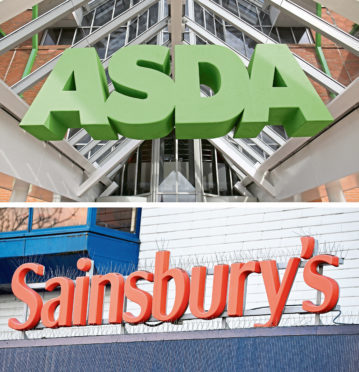Britain’s competition watchdog has launched the second stage of its investigation into the proposed £12 billion merger of supermarkets Sainsbury’s and Asda.
The deal will now be subject to a so-called Phase Two in-depth probe to assess how it could affect competition for UK shoppers, the Competition and Markets Authority (CMA) confirmed.
The CMA’s investigation will consider whether the tie-up could lead to less choice, higher prices or poorer quality services.
It said its initial investigations had confirmed the deal “raises sufficient concerns to be referred for a more in-depth review”.
“The companies are two of the largest grocery retailers in the UK and their stores overlap in hundreds of local areas, where shoppers could face higher prices or a worse quality of service,” the CMA added.
The CMA said its in-depth probe will also look at other issues raised so far, including those relating to fuel, general merchandise such as clothing, and whether the merged company could use its increased buying power to squeeze suppliers.
The CMA added it will send out an issues statement detailing the issues for review in the “coming weeks”.
Its panel of investigators will gather evidence through customer surveys and discussions with other retailers, suppliers and industry bodies to inform its detailed analysis.
Sainsbury’s and Asda, which is owned by US giant Walmart, have gone on record saying that suppliers will bear the brunt of a pledge to bring down the price of everyday products following their union.
It is also expected that scores of stores will have to be offloaded as part of the competition review.
Earlier this year, Sainsbury’s and Asda asked the CMA to move to the in-depth Phase Two part of the inquiry through a fast-track process.
While in most cases a full Phase One investigation is needed to determine whether a deal can be cleared, merging companies can ask the CMA to move to the second phase early.
A merger of the UK’s number two and three supermarkets, will create a supermarket titan bigger than Tesco, with revenues of £51bn and a network of 2,800 Sainsbury’s, Asda and Argos stores.
Sainsbury’s and Asda have claimed that the deal will result in cheaper everyday items, pledging cuts of around 10%, although it is not yet known where the price reductions will fall.
Sainsbury’s confirmed in July it had secured a £3.5bn funding package “on attractive terms” for the mega-merger.
It plans to deliver around £500m in cost savings from the deal – excluding investment in price cuts.
